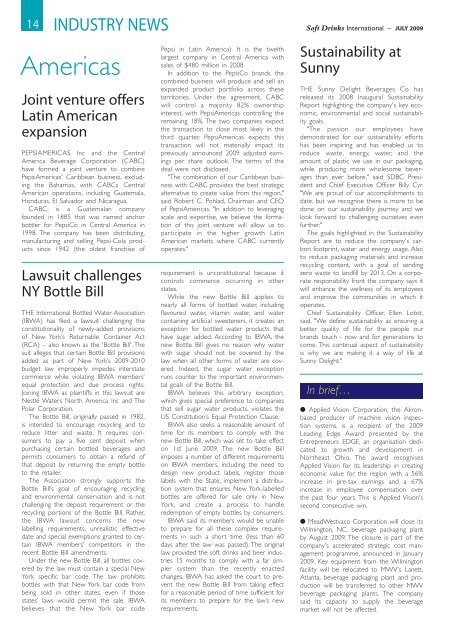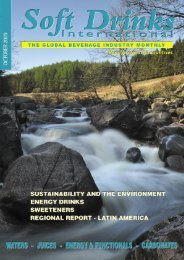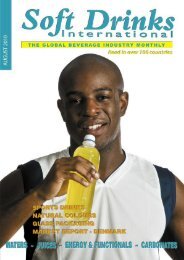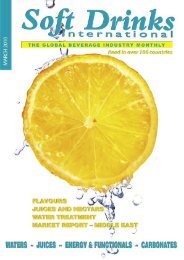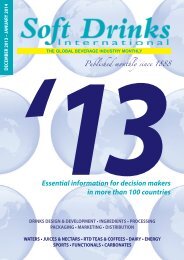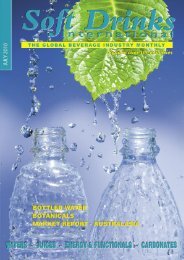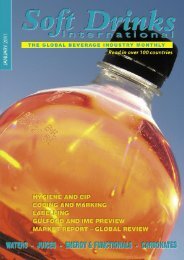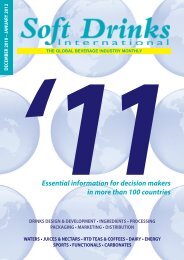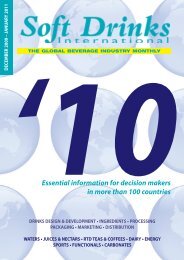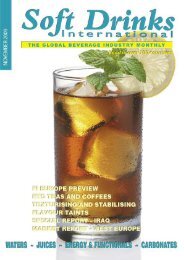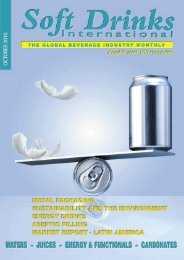SDI JUL09.qxd - Soft Drinks International
SDI JUL09.qxd - Soft Drinks International
SDI JUL09.qxd - Soft Drinks International
Create successful ePaper yourself
Turn your PDF publications into a flip-book with our unique Google optimized e-Paper software.
INDUSTRY NEWS<br />
14 <strong>Soft</strong> <strong>Drinks</strong> <strong>International</strong> – JULY 2009<br />
Americas<br />
Joint venture offers<br />
Latin American<br />
expansion<br />
PEPSIAMERICAS Inc and the Central<br />
America Beverage Corporation (CABC)<br />
have formed a joint venture to combine<br />
PepsiAmericas' Caribbean business, excluding<br />
the Bahamas, with CABCs Central<br />
American operations, including Guatemala,<br />
Honduras, El Salvador and Nicaragua.<br />
CABC, is a Guatemalan company<br />
founded in 1885 that was named anchor<br />
bottler for PepsiCo in Central America in<br />
1998. The company has been distributing,<br />
manufacturing and selling Pepsi-Cola products<br />
since 1942 (the oldest franchise of<br />
Lawsuit challenges<br />
NY Bottle Bill<br />
THE <strong>International</strong> Bottled Water Association<br />
(IBWA) has filed a lawsuit challenging the<br />
constitutionality of newly-added provisions<br />
of New York’s Returnable Container Act<br />
(RCA) – also known as the 'Bottle Bill'. The<br />
suit alleges that certain Bottle Bill provisions<br />
added as part of New York’s 2009-2010<br />
budget law improperly impedes interstate<br />
commerce while violating IBWA members’<br />
equal protection and due process rights.<br />
Joining IBWA as plaintiffs in this lawsuit are<br />
Nestlé Waters North America Inc and The<br />
Polar Corporation.<br />
The Bottle Bill, originally passed in 1982,<br />
is intended to encourage recycling and to<br />
reduce litter and waste. It requires consumers<br />
to pay a five cent deposit when<br />
purchasing certain bottled beverages and<br />
permits consumers to obtain a refund of<br />
that deposit by returning the empty bottle<br />
to the retailer.<br />
The Association strongly supports the<br />
Bottle Bill’s goal of encouraging recycling<br />
and environmental conservation and is not<br />
challenging the deposit requirement or the<br />
recycling portions of the Bottle Bill. Rather,<br />
the IBWA lawsuit concerns the new<br />
labelling requirements, unrealistic effective<br />
date and special exemptions granted to certain<br />
IBWA members’ competitors in the<br />
recent Bottle Bill amendments.<br />
Under the new Bottle Bill, all bottles covered<br />
by the law must contain a special New<br />
York specific bar code. The law prohibits<br />
bottles with that New York bar code from<br />
being sold in other states, even if those<br />
states’ laws would permit the sale. IBWA<br />
believes that the New York bar code<br />
Pepsi in Latin America). It is the twelth<br />
largest company in Central America with<br />
sales of $480 million in 2008.<br />
In addition to the PepsiCo brands, the<br />
combined business will produce and sell an<br />
expanded product portfolio across these<br />
territories. Under the agreement, CABC<br />
will control a majority 82% ownership<br />
interest, with PepsiAmericas controlling the<br />
remaining 18%. The two companies expect<br />
the transaction to close most likely in the<br />
third quarter. PepsiAmericas expects this<br />
transaction will not materially impact its<br />
previously announced 2009 adjusted earnings<br />
per share outlook. The terms of the<br />
deal were not disclosed.<br />
"The combination of our Caribbean business<br />
with CABC provides the best strategic<br />
alternative to create value from this region,"<br />
said Robert C. Pohlad, Chairman and CEO<br />
of PepsiAmericas. "In addition to leveraging<br />
scale and expertise, we believe the formation<br />
of this joint venture will allow us to<br />
participate in the higher growth Latin<br />
American markets where CABC currently<br />
operates."<br />
requirement is unconstitutional because it<br />
controls commerce occurring in other<br />
states.<br />
While the new Bottle Bill applies to<br />
nearly all forms of bottled water, including<br />
flavoured water, vitamin water, and water<br />
containing artificial sweeteners, it creates an<br />
exception for bottled water products that<br />
have sugar added. According to IBWA, the<br />
new Bottle Bill gives no reason why water<br />
with sugar should not be covered by the<br />
law when all other forms of water are covered.<br />
Indeed, the sugar water exception<br />
runs counter to the important environmental<br />
goals of the Bottle Bill.<br />
IBWA believes this arbitrary exception,<br />
which gives special preference to companies<br />
that sell sugar water products, violates the<br />
US Constitution’s Equal Protection Clause.<br />
IBWA also seeks a reasonable amount of<br />
time for its members to comply with the<br />
new Bottle Bill, which was set to take effect<br />
on 1st June 2009. The new Bottle Bill<br />
imposes a number of different requirements<br />
on IBWA members, including the need to<br />
design new product labels, register those<br />
labels with the State, implement a distribution<br />
system that ensures New York-labelled<br />
bottles are offered for sale only in New<br />
York, and create a process to handle<br />
redemption of empty bottles by consumers.<br />
IBWA said its members would be unable<br />
to prepare for all these complex requirements<br />
in such a short time (less than 60<br />
days after the law was passed). The original<br />
law provided the soft drinks and beer industries<br />
15 months to comply with a far simpler<br />
system than the recently enacted<br />
changes. IBWA has asked the court to prevent<br />
the new Bottle Bill from taking effect<br />
for a reasonable period of time sufficient for<br />
its members to prepare for the law’s new<br />
requirements.<br />
Sustainability at<br />
Sunny<br />
THE Sunny Delight Beverages Co has<br />
released its 2008 Inaugural Sustainability<br />
Report highlighting the company's key economic,<br />
environmental and social sustainability<br />
goals.<br />
"The passion our employees have<br />
demonstrated for our sustainability efforts<br />
has been inspiring and has enabled us to<br />
reduce waste, energy, water, and the<br />
amount of plastic we use in our packaging,<br />
while producing more wholesome beverages<br />
than ever before," said SDBC President<br />
and Chief Executive Officer Billy Cyr.<br />
"We are proud of our accomplishments to<br />
date, but we recognise there is more to be<br />
done on our sustainability journey and we<br />
look forward to challenging ourselves even<br />
further."<br />
The goals highlighted in the Sustainability<br />
Report are to reduce the company's carbon<br />
footprint, water and energy usage. Also<br />
to reduce packaging materials and increase<br />
recycling content, with a goal of sending<br />
zero waste to landfill by 2013. On a corporate<br />
responsibility front the company says it<br />
will enhance the wellness of its employees<br />
and improve the communities in which it<br />
operates.<br />
Chief Sustainability Officer, Ellen Lobst,<br />
said, "We define sustainability as ensuring a<br />
better quality of life for the people our<br />
brands touch - now and for generations to<br />
come. This continual aspect of sustainability<br />
is why we are making it a way of life at<br />
Sunny Delight."<br />
In brief…<br />
● Applied Vision Corporation, the Akronbased<br />
producer of machine vision inspection<br />
systems, is a recipient of the 2009<br />
Leading Edge Award presented by the<br />
Entrepreneurs EDGE, an organisation dedicated<br />
to growth and development in<br />
Northeast Ohio. The award recognises<br />
Applied Vision for its leadership in creating<br />
economic value for the region with a 56%<br />
increase in pre-tax earnings and a 67%<br />
increase in employee compensation over<br />
the past four years. This is Applied Vision's<br />
second consecutive win.<br />
● MeadWestvaco Corporation will close its<br />
Wilmington, NC, beverage packaging plant<br />
by August 2009. The closure is part of the<br />
company's accelerated strategic cost management<br />
programme, announced in January<br />
2009. Key equipment from the Wilmington<br />
facility will be relocated to MWV's Lanett,<br />
Atlanta, beverage packaging plant and production<br />
will be transferred to other MWV<br />
beverage packaging plants. The company<br />
said its capacity to supply the beverage<br />
market will not be affected.


